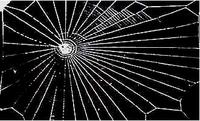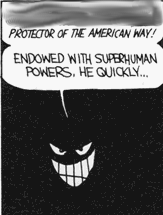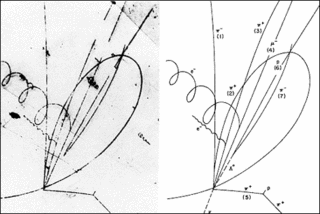The Rules
Welcome to Exquizite Quizine, a quizzing blog, whose weird set of questions and irregularity of updation are but a reflection of similar qualities in it's creator. Welcome to this blog an good luck in answering the questions which feature here, and you're welcome to post answers as comments. Just make sure that if you're answering questions then encrypt them in any ingenious fashion which ensures that others don't end up accidentally reading them. One suggestion is ROT13[W]
Cheerio and as the notice on some other less well known place says, Abandon All Hope Ye Who Enter.
Cheerio and as the notice on some other less well known place says, Abandon All Hope Ye Who Enter.
Saturday, September 10, 2005
(3) The Third Eye
The sets 4, 5, 6, 7 are still open for answers, and the eighth set is up.
Now for the answers to the third set :
¡Adiós!
Shanth
In case you want to be informed by email whenever a new set is posted you can join the mailing list by sending an email with the Subject:"ExQ join" to installer DOT swan AT gmail DoT com
Now for the answers to the third set :
- Q1: Both George and Sumeet got this one, it was JFK in a 1963 speech in West Berlin. There is an interesting article about the exact semantics of using the indefinite artice ein, here. According to that article the statement actually means something like I have the characteristics of a Berliner, rather than I am a Berliner.
- Q2: The answer is (天空の城ラピュタ)Laputa:Castle in the Sky. Laputa is flying island in Jonathon Swift's Gulliver's Travels. Literally, La Puta would be the whore in most Romance languages, and supposedly Swift meant it to be an allegory of Britain (in context of their suppression of Ireland, cf Swift's The Drapiers Letters)
- Q3: The arbit question. No special funda in this question. It's just that the ability of humans to easily identify languages spoken/written even when we don't know the language always amazes me. Douglas Hofstadter has apparently done quite a bit of work on this problem, and things like what we mean by the essence of a character, eg. `a', which in different fonts/styles can take drastically different yet be recognisable. If you want to check some of your answers check this blog. In case anybody's interested I got 12 of them.
¡Adiós!
Shanth
[8] The Colour of Magic
With this, the eighth set of questions I'm realising that as usual having bitten off more than can be masticated in comfort, I'm running out of satisfactory questions. Being a man of great integrity and many virtues (humility being the foremost on that list) I guess I'll have to reduce the frequency of updation, rather than post what I would consider substandard questions, but I'll still try to maintain a routine of at least one, and usually two updates per week. Anyway, on to the Quiz:
That's it fer now, bonus question, what's the funda behind the title of this post?
PS: Will be posting the answers to the third Quiz soon.
- Q1: Identify the speaker(also the man in the picture):
Mutual understanding would be immensely facilitated by the use of one universal tongue. But which shall it be, is the great question. At present it looks as if the English might be adopted as such, though it must be admitted that it is not the most suitable. Each language, of course, excels in some feature. The English lends itself to a terse, forceful expression of facts. The French is precise and finely distinctive. The Italian is probably the most melodious and easiest to learn. The Slavic tongues are very rich in sound but extremely difficult to master. The German is unequaled in the facility it offers for coining and combining words. A practical answer to that momentous question must perforce be found in times to come, for it is manifest that by adopting one common language the onward march of man would be prodigiously quickened. I do not believe that an artificial concoction, like Volapuk, will ever find universal acceptance, however time-saving it might be. That would be contrary to human nature. Languages have grown into our hearts. I rather look to the possibility of a reversion to the old Latin or Greek mother tongues, basing myself in this conclusion on the Spencerian law of rhythm. It seems unfortunate that the English-speaking nations, who are now fittest to rule the world, while endowed with extraordinary energy and practical intelligence, are singularly wanting in linguistic talent.

This gentleman spoke in addition to his native language Serbo-Croatian: Latin, Italian, French, German, and English. He was famous though, not for his knowledge of languages or anything, being an extremely prolific inventor with over 700 patents. Some people claiming that he had harnessed the Rays of the Sun; Discovered Ways of Transmitting Power without Wires and of Seeing by Telephone; Invented a Means of Employing Electricity as a Fertiliser; and much more . . . - Q2: What are these pictures, results of a NASA study about?






- Q3: Arbit question for the day: What does this map depict?

That's it fer now, bonus question, what's the funda behind the title of this post?
PS: Will be posting the answers to the third Quiz soon.
Monday, September 05, 2005
(2) The Second Fix
Here're the answers to the second set:
ciao,
Shanth
- Q1: The answer is JRR Tolkien. This is from an essay of his called A Secret Vice, about the act of conlanging. A slightly obscure one, but very well known withing the conlanging community, in fact the phrase 'Yes, I think I shall express the accusative case by a prefix!' came pretty close to being the motto of the conlanging community.
- Q2: George got this one, the answer is the Romani people or the gypsies(the term is sometimes considered derogatory). The bulk of linguistic evidence seems to indicate that they migrated from the Indian subcontinent around 1000AD or so.
- Q3: This was really arbit, but anyway it's a great story made all the more beautiful by the fact that it's factual. It's about the 47 Ronin. Check out the story at wikipedia.
ciao,
Shanth
[7] Le Septième Set
10 points before I get to the official set.
01)Is there a mention of the names of the seven horses of Surya, in mythology? I've been curious about this for quite some time, and if so are they in any way linked to the days of the week.(I know the days are named after the Navagrahas sans Rahu and Ketu). Let me know if you have any clue. Anyway, back to today's set:
10)Noting that ^C^V is the best form of flattery, I'm thinking of maintaining a list of ratings for questions as well. The rating system is as follows:
Obscurity/Difficulty: 3-Arcane, 2-Difficult Question 1-Common Knowledge
Quality/Class: a-The Real Grade-A shit, b-Interesting funda, c-Run-of-the-mill question
Just post these as comments to the post which announces the answers.
You do know binary, right?
That's all for now,
Shanth
PS: Will be posting solutions for set 2 soon.
01)Is there a mention of the names of the seven horses of Surya, in mythology? I've been curious about this for quite some time, and if so are they in any way linked to the days of the week.(I know the days are named after the Navagrahas sans Rahu and Ketu). Let me know if you have any clue. Anyway, back to today's set:
10)Noting that ^C^V is the best form of flattery, I'm thinking of maintaining a list of ratings for questions as well. The rating system is as follows:
Obscurity/Difficulty: 3-Arcane, 2-Difficult Question 1-Common Knowledge
Quality/Class: a-The Real Grade-A shit, b-Interesting funda, c-Run-of-the-mill question
Just post these as comments to the post which announces the answers.
You do know binary, right?
- Q1: Connect the following images:




- Q2: The American Dialect Society had, in 2003, voted "to google" as the most popular neologism of 2002. Google then sent a cease-and-desist letter to Paul McFedries, creator of the site www.wordspy.com, and demanded that he remove google from his lexicon. However, apparently due to an explicit condition in US trademark laws, Google couldn't force him to do so. What is the funda? As a hint: This Calvin & Hobbes strip inspired the title of a slashdot article on this issue.

- Q3: When the band X composed a song based on Y's book Z, the author Y refused to allow them to call their song Z. When the band sent a letter to Y's agent requesting permission, his agent responded: "No. Because Y doesn't like rock bands, particularly heavy rock bands, and especially rock bands like X." They tried to convince Y that the song would be a good promo for the book, but he still refused. So they were finally forced to name the song something else. Identify. As a hint, the song contains many seemingly senseless words ("Fremen," "Caladan," "gom jabbar," "Muad'Dib," etc.) all derived from the Z. The singer did, understandably, mispronounce some of these words.
(Thanks to George for the question)
That's all for now,
Shanth
PS: Will be posting solutions for set 2 soon.
Saturday, September 03, 2005
[6] Revenge of the Sixth
The Sixth Set of Questions:
さようなら,
Shanth
- Q1: A visual connect:




Need a clue? ``Three __ for __ __'' - Q2: Coining a famous phrase, Orwell wrote:
We may be heading not for general breakdown but for an epoch as horribly stable as the slave empires of antiquity. James Burnham's theory has been much discussed, but few people have yet considered its ideological implications - this is, the kind of world-view, the kind of beliefs, and the social structure that would probably prevail in a State which was once unconquerable and in a permanent state of '__ __' with its neighbours.
Fill in the blanks. - Q3: Consider the following that appeared in the Nepal Times sometime in Feb this year:
The sudden epidemic of tree-felling along Kathmandu’s streets is drastic, misguided and not consonant with the needs of the population. In an increasingly congested valley, foliage provides both utility and aesthetics . . . They provide shade to the pedestrian, a demographic category which today is highly neglected by our increasingly motorised urban populace . . . Take away the trees from our sight and senses and our very existence suffers . . . True, Kathmandu’s poplars and eucalyptus are imports and that they do not have the strength of indigenous varieties. But the fact is that they have provided cover and beauty for a long time now. They have become our own, like so many other exotic species that dot the landscape. It is said that these imports are vulnerable to strong winds due to loose root structures but our analysis shows that the maligned arbours have not been guilty of destruction to the extent that they have to be done away with. All in all, the trees should not have been axed. Because the damage has been done, can we ask the concerned authority to promptly correct the move and bring back greenery?
This odd article which appeared in the editorial of a leading Nepali Daily, was accompanied by several similar ones (such as an article on ``Socks and Society'', on the hygienic importance of wearing clean socks and stuff) in other Nepali Nespapers. What is the reason for this weird phenomenon in the Himalayan Kingdom? Need a hint? This somewhat similar to an obituary printed a long time ago, in the Times of India about the death of Ruth's husband. [Its a beautiful funda]
さようなら,
Shanth
[*] Why Seven?
Before, I present the sixth set for your empuzzlement, let me share some useless trivia (I realize that the qualifier useless is redundant) and a request for info. Does anyone have any idea as to what is the reason for the universality of the 7-day day week? Ie. not only do we have a 7-day week in most cultures around the world, but also, each day is always associated with the same planet(at least the Hindi, Tamil names of Days agree with the English ones).
Is there some unique astronomical funda? One possible explanation could be that that all these derive from the same source, and there is no fundamental reason for it to be so. I mean the Tamil days could easily have, been a borrowing from the Sanskritic Aryans, and not an inherent Dravidian scheme (I personally have no clue about this) and given the commonalities in Hindu and Graeco Roman mythology, it would not be totally implausible for a link there. However, as I said, I have no hard facts on this either way. Anyone got answers? [BTW, some of these links ( 1 2 ) give some explanations but still far from satisfactory]
Is there some unique astronomical funda? One possible explanation could be that that all these derive from the same source, and there is no fundamental reason for it to be so. I mean the Tamil days could easily have, been a borrowing from the Sanskritic Aryans, and not an inherent Dravidian scheme (I personally have no clue about this) and given the commonalities in Hindu and Graeco Roman mythology, it would not be totally implausible for a link there. However, as I said, I have no hard facts on this either way. Anyone got answers? [BTW, some of these links ( 1 2 ) give some explanations but still far from satisfactory]
Friday, September 02, 2005
(1) The First Unveiling
*drumroll* . . . Tada! The answers to the first Quiz:
With you, may the force be,
Shanth
- Q1: Rare Hand Axe, got this one right, it is the first documented use of the '=' sign. In his book the The Whetstone of Witte (1557) he says ``to avoid the tediouse repetition of these woordes: is equalle to : I will sette as I doe often in woorke use, a pair of paralleles, or Gemowe [ie twin] lines of one lengthe, thus: =, bicause noe 2 thynges, can be maore equalle.''. Apparently there's a memorial in honour of this at the St Mary’s Church in Tenby, Wales.
- Q2: In spite of an interesting attempt by Rare Hand Axe, the answer is that it's actually the depiction of Penny Lane* as described in a Beatles' song of the same name:
In penny lane there is a barber showing photographs
Of every head he’s had the pleasure to know.
And all the people that come and go
Stop and say hello.
.
.
. - Q3: X is by Admiral Isoroku Yamamoto, the man in charge of the Pearl Harbour attack, and the quote is from Tora! Tora! Tora!(Y). George got kinda close with his guess about the Emperor of Japan. Check out wikipedia for more.
- Q4: Now for my preciouss I was hoping somebody would get it at least partially. The link is: Snark. The first is an illustration from Lewis Carrol's The Hunting of the Snark, the second is a set of what are called snarks(of Four-Colour Theorem fame), in graph theory, they're basically graphs with three edges per vertex which need at least 4 colours to colour all the edges so that no two intersecting edges have the same colour(they are called so, because of their elusivity a la, Carrol's mysterious creature), the third is the SM-62 Snark, which was a specialised intercontinental missile with a nuclear warhead briefly operated by the US Strategic Air Command from 1958 until 1961. And finally the last one is of course the Websnark.
With you, may the force be,
Shanth
 African or European
African or European

